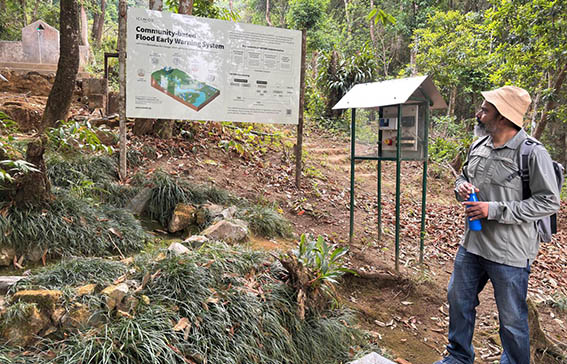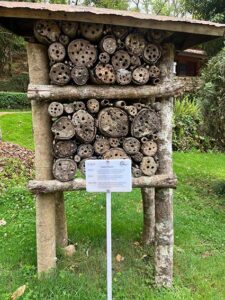Climate change impact has become a global concern as it is evident and unescapable. Amidst this scenario, Living Mountain Lab (LML) of International Centre for Integrated Mountain Development (ICIMOD) provides an exemplary service on climate change adaptation solutions for the Hindu Kush Himalaya region (HKH).
ICIMOD’s LML located in lush greenery hills of Godavari, Nepal. This site set up in 30 hectares of land in 1993 has been rejuvenated from completely from degraded forest, transforming it as a place of rich biodiversity. People who have explore the tranquil beauty of LML even commented as an experience of mini safari.
As per information written on the display board erected at the entrance of LML, the lab has documented 34 species of cultivated plants, 695 species of wild flora that includes Medicinal and aromatic plants (93), orchi
ds (56), edible plants (54); the wild fauna are Birds (100), butterflies (97), dragonflies (54), large and small mammals (13), spiders (6), snakes (4) earthworms (2).
The rare and endangered orchids found in this lab are Bulbophyllum polyrrhizum, Phalaenopsis difformis, Herpysma longicaulis. Mammals recognized at the park are Leopard (Panthera pardus), leopard cat (Prionailurus bengalensis), jungle cat (Felis chaus), Asiatic black bear (Ursus thibetanus), barking deer (Muntiacus muntjak), wild pig (Sus scrofa), masked palm civet (Paguma larvata), large Indian civet (Viverra zibetha), yellow-throated marten (Martes flavigula), Himalayan crestless porcupine (Hystrix brachyura), black-naped hare (Lepus nigricollis), and rhesus macaque (Macaca mulatta).
ICIMOD-an intergovernmental knowledge and learning centre works on mountain policy with main emphasis on Hindu Kush Himalaya (HKH) region covering eight countries. They are Afghanistan, Bangladesh, Bhutan, China, India, Myanmar, Nepal, and Pakistan.
In the face of climate
change impact, LML can be considered as a source of inspiration viewing their activities. Climate change has hugely impacted rural economy. To address this issue, LML demonstrate appropriate technology for sustainable farming practices. As the lab is known for their innovation, it also displays a solar-powered technologies to disaster risk reduction systems.
“People from various countries have been visiting LML earlier known as Knowledge Park to look and learn the range of interventions that are possible to support integrate mountain farming, income generation, and livelihood improvement approaches. The visitors include government ministries, senior staff from governments, INGOs, NGOs, and UN organizations, community leaders, scientists, academics, representation of women’s and farmers’ groups,” said one of their official.
Forest plays a pivotal role in regulating global climate, providing habitat for biodiversity and well-being of human. The livelihoods of the people living close to forest and within the forests are inextricably linked to the forest ecosystem. Above this, enhancing the rural economy that has been impacted by climate change is of utmost need for the conservation of forest ecosystem.
Manipur being one of the state having 90 percent of geographical region with hilly terrain. Observing the prevailing scenario of forest degradation in the state, it is need of hour to develop mountain development policy giving special attention on community participation and motivation for the conservation of forest.













